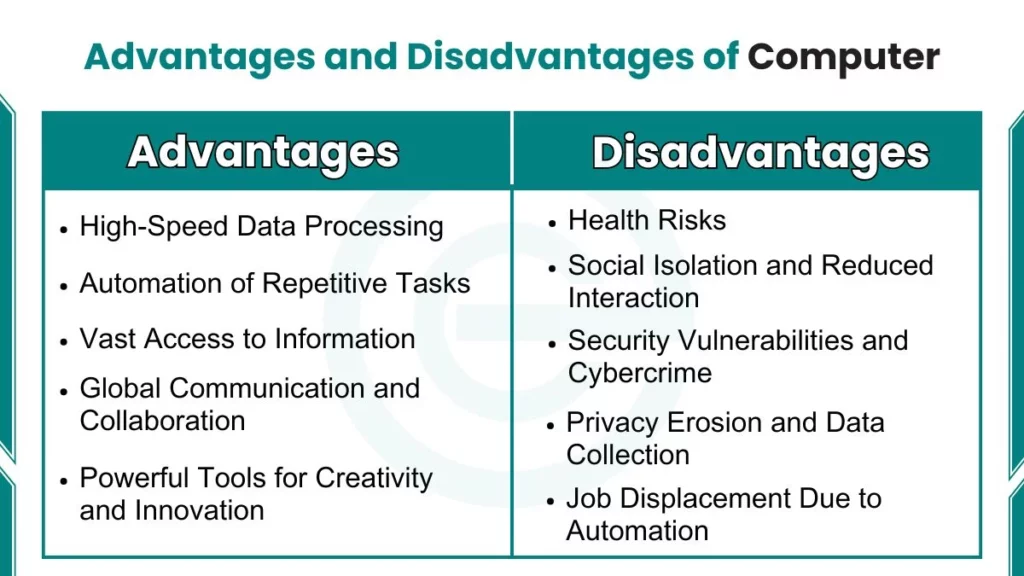Computers are one of the most important inventions in human history. From doing simple calculations to controlling rockets in space, computers make our lives faster and easier. But just like every other technology, computers also have advantages and disadvantages. In this article, we will explore the 10 main advantages and disadvantages of computers that help you understand their impact on our daily lives.

Advantages of Computer
Here are advantages of computers:
1. Speed and Accuracy
One of the biggest advantages of computers is their speed. A computer can do a task that may take hours for a human in just a few seconds. Computers perform millions of calculations instantly and give accurate results without errors.
This is why they are used in banks for transactions, in grade schools, and in industries for managing data.
2. Storage Capacity
A computer can store a huge amount of data, such as documents, videos, photos, and more, in a very small space. Instead of keeping physical files or papers, we can now save everything digitally. This makes data easy to organize, search, and share when needed.
3. Automation and Efficiency
Computers help automate tasks that used to take hours. Payroll systems, ticket bookings, and even factory operations are now handled automatically. This increases efficiency and allows humans to focus on more creative and complex work.
4. Connectivity and Communication
The computer connects people all over the world. Through the internet, emails, video calls, and social media. We can talk and share ideas instantly. Computers make online learning, remote work, and digital meetings possible, bringing the whole world closer.
5. Education and Research
Computers are powerful learning tools. Students can attend online classes, read e-books, and watch educational videos from anywhere. Researchers use computers to study data, perform experiments, and share knowledge globally. Learning has never been this easy and accessible.
6. Entertainment and Creativity
From playing games and watching movies to creating digital art or music, computers are full of fun and creativity. Many people use computers for video editing, animation, and graphic design. They provide both enjoyment and opportunities to learn new creative skills.
7. Data Processing and Analysis
Computers handle and analyze large amounts of data quickly. For example, scientists use them to study weather patterns or diagnose diseases. Businesses analyze customer data to make better decisions. This ability to process information helps industries grow faster.
8. Cost-Effectiveness in Long Term
While buying a computer can be expensive at first, it saves money in the long run. Automated systems reduce the need for extra workers, and digital work cuts down paper and storage costs. Once set up, a computer increases productivity and efficiency.
9. Support in Healthcare
In hospitals, computers store patient records, operate medical equipment, and assist in surgeries. Doctors use them for diagnosis, treatment planning, and telemedicine. This improves healthcare quality and saves lives through accurate medical support.
10. Job Opportunities and Digital Skills
Computers create new career opportunities in IT, programming, graphic design, and e-commerce. Learning computer skills increases your chances of getting a better job. In today’s world, digital skills are just as important as reading and writing.
Disadvantages of Computer
The following are disadvantages of computer:
1. Health Problems
Sitting in front of a computer for long hours can cause eye strain, back pain, and headaches. Lack of movement may lead to other health issues too. It’s important to take breaks and maintain proper posture while using computers.
2. Data Privacy and Security Risks
Since most of our information is stored online, there’s always a risk of hacking and data theft. Cybercriminals can steal personal or financial data. Users must use strong passwords, antivirus software, and stay alert online.
3. Unemployment Due to Automation
Automation is helpful but also replaces some human jobs. Machines can now do repetitive work faster and cheaper than humans, which reduces employment for certain roles. Workers need to keep upgrading their skills to stay relevant.
4. Social Isolation
Spending too much time on computers can reduce face-to-face interaction. Many people prefer chatting online instead of meeting in person, which sometimes causes loneliness or weakens social relationships.
5. Internet Addiction
Some people spend hours playing games or scrolling social media. This leads to addiction, lack of focus, and poor academic performance. Using the computer responsibly helps maintain a healthy balance.
6. High Maintenance and Upgradation Cost
Computers require regular updates and maintenance. Software needs to be updated, antivirus programs renewed, and hardware repaired. These upgrades cost money and can be a burden for some users.
7. Environmental Impact
Old computers and electronic parts create e-waste that harms the environment. They also consume electricity, contributing to energy pollution. Recycling and responsible disposal are necessary to reduce this problem.
8. Dependency on Computers
Many people depend too much on computers, even for simple tasks like calculations or writing. This reduces creativity and problem-solving skills. Relying too heavily on technology can make us less active thinkers.
9. Cyberbullying and Online Scams
The internet is not always safe. Some people misuse computers to bully others, spread hate, or run scams. This can cause emotional harm and financial loss. Students must learn how to use the internet safely and respectfully.
10. Misuse of Technology
Computers can also be used for negative activities such as hacking, piracy, and spreading fake news. Misuse of technology affects individuals and society. That’s why digital ethics and responsible behavior are very important.
